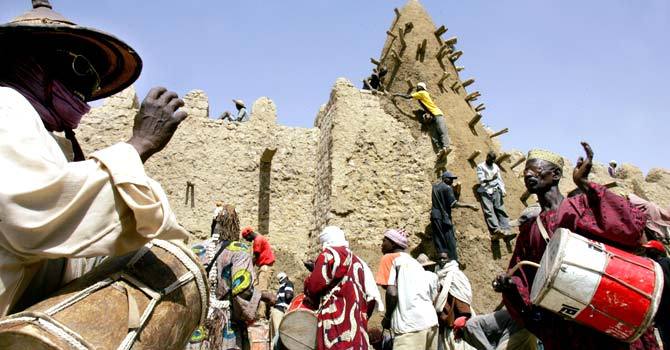By George Grant.

London, 12 November:
Libya joined with West African leaders on Sunday to agree on the deployment of a 3,300-strong military . . .[restrict]force to northern Mali to dislodge Islamist fighters who wrested control of the region earlier this year.
The decision was taken at an emergency meeting of the ECOWAS regional bloc in the Nigerian capital Abuja, as fears grow over the risks the Mali crisis poses to the region and beyond.
“We foresee 3,300 soldiers for a timeframe of one year,” Ivory Coast President Alassane Ouattara, the current ECOWAS chairman, told journalists on Sunday after the summit.
The troops would come primarily from ECOWAS, but may include countries from outside the bloc as well.
Outtara said he hoped approval from the UN Security Council could come in late November or early December, which would allow the force to be deployed shortly afterwards.
Mali has been in a state of crisis since 22 March, when President Amadou Touré was forced from office by mutinous soldiers displeased over his handling of a rebellion in the north of the country by a Tuareg rebel group, the National Movement for the Liberation of Azawad (MNLA).
Bolstered by significant numbers of battle-hardened fighters from Libya, the Tuareg rebels were also joined by the Al-Qaeda linked Islamist group Ansar Dine, who together succeeded in taking de facto control of northern Mali by early April.
Disagreements between the MNLA and the Islamists resulted in subsequent clashes which saw Ansar Dine and its supporters take control of all major northern towns by 17 July.
Regional leaders fear that unless the crisis is resolved quickly, the conflict could spill over into neighbouring countries and contribute to broader regional instability.
With its vast and porous borders, Libya’s remote desert south is also at risk from militant groups seeking areas of operations far from governmental control.
Following last year’s revolution in Libya, an influx of weaponry to Mali helped enable the Tuaregs to arm themselves for the rebellion.
Large numbers of weapons and fighters have also found their way from Libya to other countries in the region, and there are fears that both could be used for terrorist purposes by Islamist groups including Al-Qaeda in the Islamic Maghreb.
To date, six ECOWAS countries have offered to send troops to Mali, including Nigeria, Senegal, Niger, Burkina Faso, Ghana and Togo.
From outside of ECOWAS Chad is said to be considering participation, whilst contacts have also been made with Mauritania and South Africa. Libya is not believed to be considering involvement.
Efforts to reach a negotiated settlement are still ongoing, with ECOWAS Commission President Kadre Desire Ouedraogo urging the bloc to pursue a dual approach of dialogue and military pressure.
Algeria in particular is known to be hesitant about a military solution, for fear of the potential spillover into its own territory.
Although not a member of ECOWAS, Algeria is seen as key to any intervention owing to its superior military and intelligence capabilities, and the long border it shares with Mali.
Algeria also has significant experience in combating extremism, having put down a bloody insurrection by the Salafist Group for Preaching and Combat (GSPC) that took place in Algeria in the late 1990s and early 2000s.
The GSPC’s successor, which now operates in the more remote parts of North Africa and the Sahel, is Al-Qaeda in the Islamic Maghreb.
Serious questions remain, however, as to how successful any non-military negotiations will be with a militant Islamist group such as Ansar Dine.
In the final communiqué of yesterday’s summit, member states were urged “to concretise their commitments to provide military and logistical contributions to the ECOWAS military efforts.” [/restrict]








